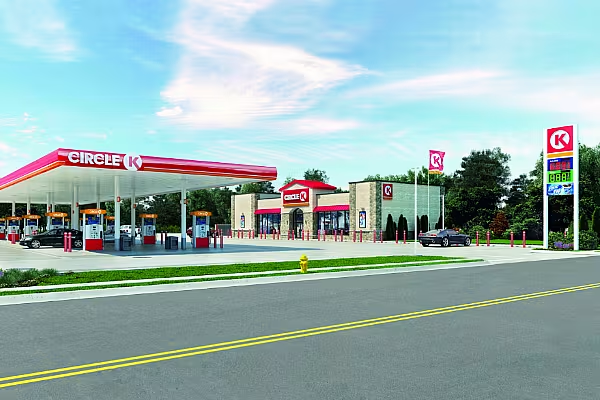Alimentation Couche-Tard Inc. has the track record and balance sheet to pull off a purchase of rival CST Brands Inc. in what would be the biggest deal yet for the acquisitive Canadian retailer, investors said.
Couche-Tard is the front-runner to buy CST Brands in a purchase valued at more than $3.4 billion, The Wall Street Journal reported late Monday. Couche-Tard wouldn’t comment on CST directly, saying it’s in discussions over “possible business transactions.” An acquisition at that price would exceed the largest deal in its 36-year history -- the 2012 purchase of Statoil Fuel & Retail ASA for about $2.8 billion.
Though a deal for CST would likely be financed with a sale of bonds and possibly stock, Couche-Tard’s history of cutting debt through real estate sales, cost savings and staff reductions means investors would likely see benefits from a transaction within months, said Greg Dean of CI Investments Inc.’s Cambridge Global Asset Management.
“These guys know what it takes to make these deals worthwhile,” Dean, whose firm oversees about C$17 billion ($13 billion) and owns Couche-Tard stock, said by telephone from Toronto. “They’ve been successful at growing by acquisitions for more than 30 years.”
Couche-Tard’s stock rose 0.7 percent Wednesday to C$62.45 in Toronto, close to a record high -- boosting the company’s market value to about C$35.5 billion. The shares have jumped more than sixfold in the five years through Tuesday, exceeding the 35 percent total return of Canada’s benchmark S&P/TSX Composite Index. The company’s 2026 euro bond fell almost 1 percent Tuesday before rebounding Wednesday.
Karen Romer, a Couche-Tard spokeswoman, declined to comment.
Based in Laval, Quebec, Couche-Tard is Canada’s largest convenience-store operator with a global network of more than 12,000 locations under brands such as Mac’s and Circle K. CST operates about 2,000 fuel and convenience stores in the U.S. San Antonio, Texas-based CST soared 6.3 percent Tuesday and now has a value of $3.58 billion. It may fetch as much as $56 a share in a sale, or about $4.2 billion, according to Wells Fargo.
Adding CST’s 632 Texas locations would make geographical sense for Couche-Tard, which only has about 7 percent of its U.S. stores in the Southwest region, according to Vishal Shreedhar, a National Bank Financial analyst in Toronto.
Debt Load
CST “is right in the wheelhouse” for Couche-Tard, said Diane Young, a fixed-income portfolio manager at Addenda Capital Inc., which runs about C$28 billion and owns bonds of the company.
“They’ve got low leverage, they’ve got lots of room to tack it on,” she said. “They have a great track record of leveraging up for a transaction and paying down the debt within 12 to 18 months and the ratings agencies are usually very lenient with that, simply because of their track record."
Couche-Tard had long-term debt of about $2.9 billion as of April, down from about $3.1 billion a year earlier. The company had $599.4 million of cash and cash equivalents and had access to about $1.7 billion under its revolving credit lines.
Adjusted debt amounted to 1.98 times earnings before interest, taxes, depreciation and amortization as of April, according to company statements. Following the Statoil deal in 2013, this ratio was about 3.6 times, according to company data.
‘Return-Oriented’
Acquiring CST would probably boost the leverage ratio to 3.1 times, according to National Bank Financial’s Shreedhar.
While a deal for CST could also trigger an equity issue, stockholders such as Dean say they’re unperturbed by the prospect.
“I give them the benefit of the doubt,” he said. “They are a return-oriented company, and they would only do a deal if it met their criteria. As a shareholder you know what you are getting.”
Couche-Tard is already digesting a string of acquisitions. In February, it completed the purchase of Topaz Energy Group Ltd., Ireland’s biggest convenience and fuel retailer with 444 stations. Three months later, Couche-Tard closed the acquisition of A/S Dansk Shell’s downstream retail business in Denmark. Last year, it acquired The Pantry Inc. chain for about $1.7 billion, including debt, to expand in the U.S. Southeast.
‘Very Disciplined’
Another deal, the March agreement to buy 279 Esso-branded fuel and convenience sites in Canada from Imperial Oil Ltd. for about C$1.7 billion, will probably close next month.
“Yes there’s a lot to integrate but they have very strong regional management teams,” said Jennifer Bartashus, a Bloomberg Intelligence analyst, said in a telephone interview from Princeton, New Jersey. “They definitely have the capacity and the bandwidth to look at another acquisition in the U.S.”
Couche-Tard has also shown an ability to scrap deals that didn’t make financial sense. In 2010, then-Chief Executive Officer Alain Bouchard abandoned attempts to acquire Casey’s General Stores Inc. after the U.S. company turned down repeated offers. The 67-year-old Bouchard, who founded Couche-Tard in 1980 and ranks among its largest shareholders, is now executive chairman.
“They’re very disciplined when it comes to making an acquisition,” Bartashus said. “If the numbers don’t work, they will walk away. They don’t get emotional.”
If Couche-Tard succeeds in its CST bid and decides to issue debt to fund the deal, at least one bondholder will be interested in taking a look.
"We’ll certainly take another peek at it and see if we want to increase our position in it and support the deal. We have in the past," said Patrick O’Toole, who helps manage about C$60 billion in fixed income at CIBC Asset Management Inc. CIBC owns the bonds. “We’ve been believers in management. They do what they say they’re going to do.”
News by Bloomberg, edited by ESM. To subscribe to ESM: The European Supermarket Magazine, click here.














